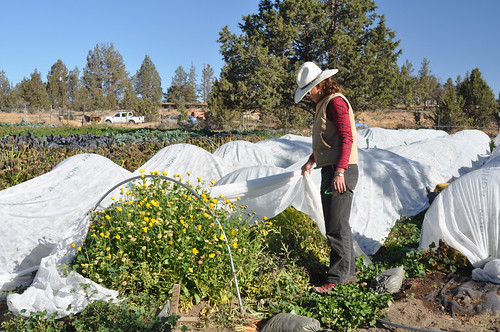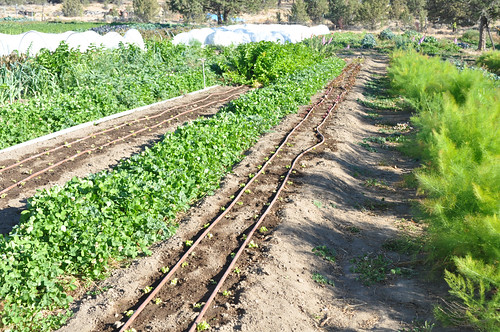
Business is blooming for Sarahlee Lawrence and her organic food-and-flower-growing operation, Rainshadow Organics, in the Central Oregon high desert. The 28-year old organic pioneer is proud of her venture and credits USDA’s Natural Resources Conservation Service (NRCS) as a key component to her success.
Lawrence approached NRCS several years ago to start the process of making her farm organic. NRCS helped her plan and implement a nutrient management program and address irrigation issues on both a two-acre vegetable-and-flower plot and a 25-acre field where she grows a mix of cover crops like wheat and clover.
NRCS provided assistance to Lawrence through two Farm Bill programs. The Environmental Quality Incentive Program (EQIP) Organic Initiative is a nationwide special effort to provide financial assistance to National Organic Program (NOP) certified organic producers, as well as producers in the process of transitioning to organic production. And the Agricultural Water Enhancement Program (AWEP) is a cooperative program to improve irrigation efficiency and reduce energy consumption.

Lawrence is especially pleased with the newly installed drip irrigation system that supplies water to more than 100 varieties of produce and a colorful assortment of flowers on her two-acre parcel.
“I could not have afforded or done that by myself,” she explains.
To be certified organic, a U.S. agricultural operation has to be approved by a USDA Accredited Certifying Agent. Applicants must comply with USDA Organic regulations and submit documentation on their property and farming practices.
Transitioning to organic is often a lengthy process, as Lawrence knows. Fields may require preparation to support organic production, including the planting of cover crops, incorporating compost and other soil-enhancing practices.
While it takes a while to transition an operation to a Certified Organic one, Lawrence is pleased with her progress. The market for fresh, locally grown food continues to expand in Central Oregon, and her customers include a local hospital, schools and restaurants.

She has also generated a new, dedicated client base through community supported agriculture (CSA). CSA is a way for consumers to directly invest in local farms and receive a regular delivery of fresh fruits, vegetables and other local products.
Lawrence looks forward to a bright, rewarding and sustainable future.
Find out more about the EQIP Organic Initiative.
Check out more conservation stories on the USDA blog.
Follow NRCS on Twitter.
